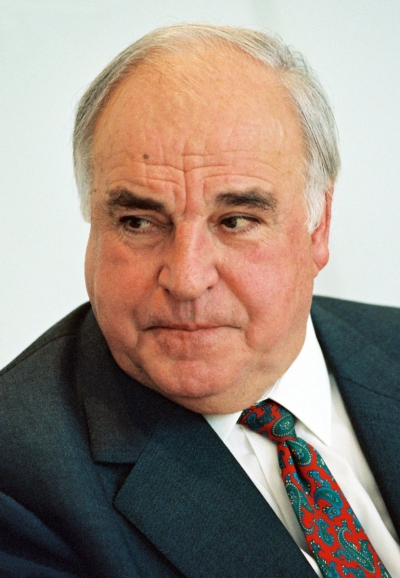The constructive vote of no confidence (German: konstruktives Misstrauensvotum, Spanish: mocin de censura constructiva) is a variation on the motion of no confidence that allows a parliament to withdraw confidence from a head of government only if there is a positive majority for a prospective successor. The principle is intended to ensure governments' stability by making sure that a replacement has enough parliamentary support to govern.
The concept was introduced on a national scale in West Germany's 1949 constitution, which remains in force after the German reunification; it has been adopted since the 1970s in other nations like Spain, Hungary, Lesotho, Israel, Poland, Slovenia, Albania, and Belgium.
Helmut Josef Michael Kohl (German pronunciation: [ˈhɛlmuːt ˈkoːl] (listen); 3 April 1930 – 16 June 2017) was Chancellor of Germany from 1982 to 1998 and Leader of the Christian Democratic Union (CDU) from 1973 to 1998. Kohl's 16-year tenure is the longest of any German chancellor since Otto von Bismarck, and oversaw the end of the Cold War, the German reunification and the creation of the European Union (EU).
Born in 1930 in Ludwigshafen to a Catholic family, Kohl joined the CDU in 1946 at the age of 16. He earned a PhD in history at Heidelberg University in 1958, and worked as a business executive before becoming a full-time politician. He was elected as the youngest member of the Parliament of Rhineland-Palatinate in 1959 and from 1969 to 1976 was minister president of the Rhineland-Palatinate state. Viewed during the 1960s and the early 1970s as a progressive within the CDU, he was elected national chairman of the party in 1973. After he had become party leader, Kohl was increasingly seen as a more conservative figure. In the 1976 and 1980 federal elections his party performed well, but the social-liberal government of social democrat Helmut Schmidt was able to remain in power. After Schmidt had lost the support of the liberal FDP in 1982, Kohl was elected Chancellor through a constructive vote of no confidence, forming a coalition government with the FDP. Kohl chaired the G7 in 1985 and 1992.
As Chancellor, Kohl was committed to European integration and especially to the Franco-German relationship; he was also a steadfast ally of the United States and supported Ronald Reagan's more aggressive policies to weaken the Soviet Union. Following the Revolutions of 1989, his government acted decisively, culminating in the German reunification in 1990. Kohl and French president François Mitterrand were the architects of the Maastricht Treaty which established the EU and the Euro currency. Kohl was also a central figure in the eastern enlargement of the EU, and his government led the effort to push for international recognition of Croatia, Slovenia, and Bosnia and Herzegovina when the states declared independence. He played an instrumental role in resolving the Bosnian War. Domestically Kohl's policies from 1990 focused on integrating former East Germany into reunified Germany, and he moved the federal capital from the "provisional capital" Bonn back to Berlin, although he never resided there because the government offices were only relocated in 1999. Kohl also greatly increased federal spending on arts and culture. After his chancellorship, Kohl became honorary chairman of the CDU in 1998 but resigned from the position in 2000 in the wake of the CDU donations scandal which damaged his reputation domestically.
Kohl received the 1988 Charlemagne Prize and was named Honorary Citizen of Europe by the European Council in 1998. Following his death, Kohl was honoured with the first-ever European act of state in Strasbourg. Kohl was described as "the greatest European leader of the second half of the 20th century" by US presidents George H. W. Bush and Bill Clinton.

1982Oct, 1
Helmut Kohl replaces Helmut Schmidt as Chancellor of Germany through a constructive vote of no confidence.
Choose Another Date
Events on 1982
- 4May
Falklands War
Twenty sailors are killed when the British Type 42 destroyer HMS Sheffield is hit by an Argentinian Exocet missile during the Falklands War. - 25May
Falklands War
HMS Coventry is sunk during the Falklands War. - 6Jun
Operation Peace for the Galilee
The Lebanon War begins. Forces under Israeli Defense Minister Ariel Sharon invade southern Lebanon during Operation Peace for the Galilee, eventually reaching as far north as the capital Beirut. - 11Sep
1982 Invasion of Lebanon
The international forces that were guaranteeing the safety of Palestinian refugees following Israel's 1982 Invasion of Lebanon leave Beirut. Five days later, several thousand refugees are massacred in the Sabra and Shatila refugee camps by Phalange forces. - 14Oct
War on Drugs
U.S. President Ronald Reagan proclaims a War on Drugs.

 English
English  español
español  français
français  português
português  русский
русский  العربية
العربية  简体中文
简体中文 